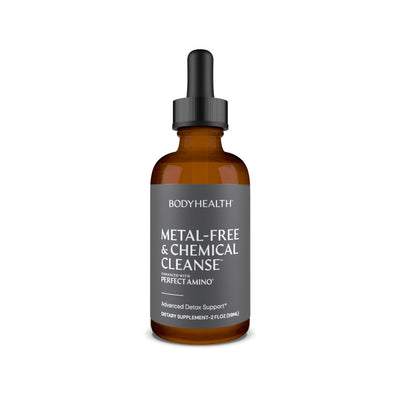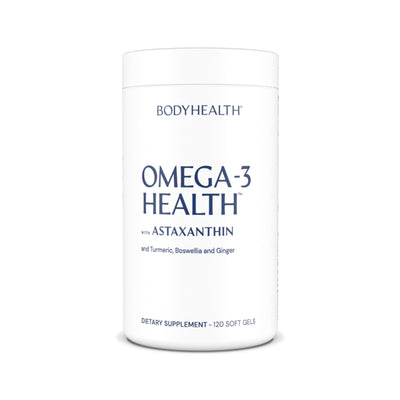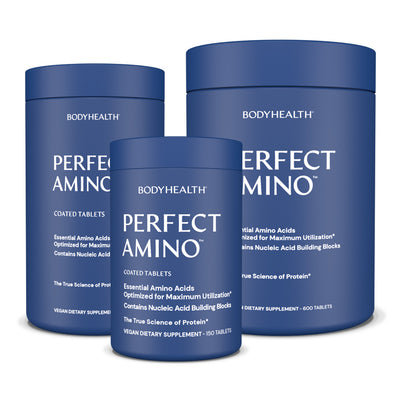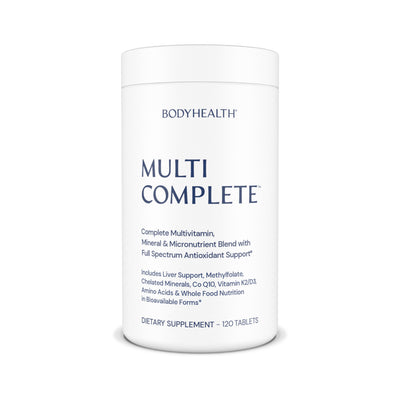How Low Testosterone Levels Are Being Normalized
June 16, 2024 5 min read

Did you know that the official measurement of what is considered to be normal testosterone levels has been lowered?
It has. And this was done because the majority of men no longer fall into the earlier acceptable ranges.
Their testosterone levels are too low.
This is a problem.
Testosterone, like Growth Hormone, plays a large role in muscle bulk and strength, as well as fat-burning — in both men and women.
Known as the “male” hormone, we see much higher numbers in men than in women, though women still need this just as men still need some estrogen, the “female” hormone.
Normal testosterone levels give men that chiseled look, high energy levels and strength. And in women we see more definition, muscle, and energy.
But it does much more.
Higher testosterone levels give smoother, firmer skin, a calmer, more even-keeled mood, and play a very large role in overall health.
And it has a significant anti-aging effect. So lowered levels contribute to accelerated, pre-mature aging.
But, while most people think lowering testosterone levels are just a part of getting older — and they are to a degree — there's actually much more going on here.
Testosterone levels, even in young men, have been dropping for decades now.
This isn't “dropping as one gets older.” This is a man in his 30s today having lower average testosterone levels than a man in his 30s forty years ago.
It got so bad that LabCorp, the largest medical testing company, lowered their standards for what are considered "normal" testosterone levels due to too many men no longer fitting into the earlier known healthy levels.
But why, instead of rolling up our sleeves and finding the cause of lowered testosterone levels… are we just going to pretend that lower levels are healthy and normal now?
Especially when... the causes are already known.
Let's find out.
LOWERING TESTOSTERONE LEVELS AREN’T SOLEY DUE TO AGING
Testosterone levels, even in young men, have been dropping for decades now.
This isn’t “dropping as one gets older.” This is a man in his 30s today having lower average testosterone levels than a man in his 30s forty years ago.
In fact, overall levels have been dropping about 1% each year for the last 50 years at least… for all ages.
We see this most dramatically in sperm counts, which are down an average of 60% since 1970. This is why we have so many fertility clinics now. We didn’t need them before.
It’s gotten so bad that LabCorp, the largest medical testing company, lowered their standards for what are considered “normal” testosterone levels due to too many men no longer fitting into the earlier known healthy levels.
As they said in their release, this was: “… endorsed by a group of professional associations, government agencies, and commercial entities in 2010.”
So government and for-profit companies pushed for this. Strange place to get a nudge from on this subject.
And doctors were not happy with it, some outright attacking LabCorp on their own websites and blogs, and validly so. Testosterone is a vital hormone in our bodies, and the lower our levels are, the lower our levels of overall health will be, and the faster our biological age advances.
The idea to lower standards of what healthy testosterone levels are to fit the average man today, instead of raising the health levels of the average man to where their hormone levels are in actual normal ranges is, quite honestly, outrageous.
Instead of rolling up our sleeves and finding the cause of the problem… we’re just going to pretend that lower levels of health is actually normal?
No.
THE STANDARD AMERICAN DIET & DECLINING TESTOSTERONE
While there could others (your body is a complex organism), we do know many key points that absolutely lower testosterone levels and which, when prevented, can result in rising testosterone levels.
And almost all of them come from what is currently the Standard American Diet, which din’t exist 40 or 50 years ago.
Sugar is an energy source. And natural sugars are just fine for the body.
But in today’s food we’ve grown so accustomed to the high number or sugars, processed sugars and other carbohydrates that we don’t realize just how much our sugar intake has grown.
It’s A LOT.
Our bodies certainly don’t need it. Though they sure are addicted to it. Just try ask most people to not eat even something ax simple as bread for a week. It will be hard for them. Most breads are almost completely sugars once inside the body, and our cells are addicted to them.
But high sugar levels bring on high cortisol levels and cortisol works on a seesaw with testosterone. When cortisol rises, testosterone lowers. And, unfortunately, the more testosterone lowers, the more cortisol rises and stays dominant, keeping testosterone levels low.
But this isn’t just from sugars. There are two essential fatty acids our cells need. One is Omega 6, which is used to make inflammatory signaling molecules, and the other is Omega 3, used to make anti-inflammatory signaling molecules.
As we know, with inflammation comes cortisol rising.
Our omega 6 to 3 ratios in our cells should be about 1 to 1.
But our foods today are incredibly high in omega 6 and very low in omega 3. This is in large part due to the vast use of corn and soy (both very high in omega 6) as the bases for almost all processed, packaged foods today.
We also see this in our meats. Cows fed corn and soy — not their natural diet — achieve ratios of about seventeen omega 6 to one omega 3, something they then pass on to us, while 100% grass-fed cows have a natural internal ratio.
This has gotten to the point where most people have an omega 6 to 3 ratio of 20:1 and even as high as 40:1.
This lifts cortisol significantly, lowering and keeping low our testosterone levels.
We also have foods so thoroughly processed that many are quite barren in real nutrition in the form of vitamins and minerals needed by the body to both manufacture testosterone, keep cortisol levels low, and properly utilize the testosterone.
And then there is the attack on cholesterol. Your body needs cholesterol to survive. As covered in this article, individuals with cholesterol levels in the low 200’s were actually found to live the longest.
Well, cholesterol is one of the main constituents of testosterone. Without it, your body can’t make testosterone, at least not in the quantities it needs.
Then there is the matter of toxins in our environment as covered earlier.
While there can be other cases, these are some of the largest culprits and points which, if handled, can significantly benefit our testosterone levels and overall health and longevity.
As far as what to do with this, beyond eating organic and grass-fed, staying away from processed foods and processed sugars, getting in your proteins levels and working out to trigger testosterone synthesis and use, I’ll cover that in the wrap up for this series as it all comes together.
But I hope this helps.
REFERENCES:
- Rosner W, Vesper H; Endocrine Society, et al. Toward excellence in testosterone testing: A consensus statement. J Clin Edocrinol Metab. 2010 Oct; 95(10):4542-4548. Pubmed 20926540
- https://pubmed.ncbi.nlm.nih.gov/16386416/
- https://academic.oup.com/jcem/article/92/1/196/2598434
- https://academic.oup.com/humupd/article/23/6/646/4035689
- https://pubmed.ncbi.nlm.nih.gov/21752898/
- https://pubmed.ncbi.nlm.nih.gov/21154195/
- https://pubmed.ncbi.nlm.nih.gov/33221700/
- https://www.healthline.com/nutrition/ways-to-lower-cortisol
- https://pubmed.ncbi.nlm.nih.gov/25551380/
- https://observer.com/2018/02/sugar-is-wreaking-havoc-on-your-hormonal-health/
- https://inbodyusa.com/blogs/inbodyblog/90571521-fat-doesnt-make-you-fat/
- https://courses.lumenlearning.com/microbiology/chapter/lipids/
- https://inbodyusa.com/blogs/inbodyblog/90571521-fat-doesnt-make-you-fat/
- https://pubmed.ncbi.nlm.nih.gov/20071648/
- https://www.ncbi.nlm.nih.gov/pmc/articles/PMC1779501/
- https://www.healthline.com/nutrition/trans-fat-foods
- https://pubmed.ncbi.nlm.nih.gov/16713393/
- https://www.nordicnaturals.com/healthy-science/omega-3-essential-fatty-acids/
- https://www.ncbi.nlm.nih.gov/pmc/articles/PMC3335257/
- https://www.ncbi.nlm.nih.gov/pmc/articles/PMC4808858/
- https://jissn.biomedcentral.com/articles/10.1186/1550-2783-7-31
- https://www.permaculturenews.org/2008/11/13/chemical-based-farming systems-robbing-us-of-nutrients/
- https://www.ars.usda.gov/ARSUserFiles/50701000/cswq-0426-yamada.pdf
- https://nongmoreport.com/articles/jan10/scientists_find_negative_impacts_of_GM_crops.php
Articles by Health Topic
Your Path To Better Health Starts Here!
From in-depth articles on nutritional benefits to updates on new product launches, stay informed and inspired on your journey to optimal health.
*These statements have not been evaluated by the Food and Drug Administration. These products are not intended to diagnose, treat, cure, or prevent any disease.






